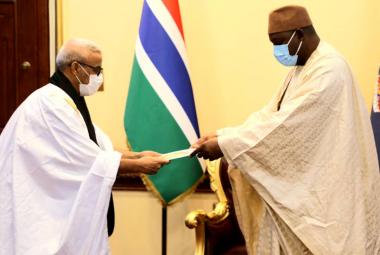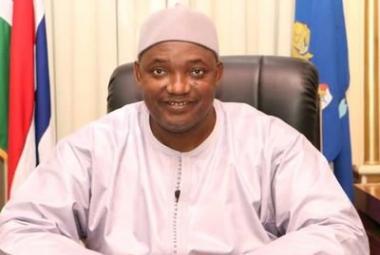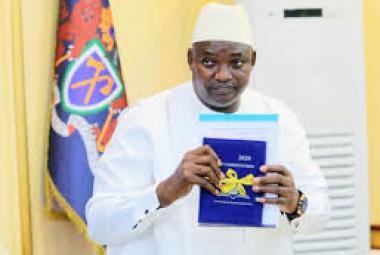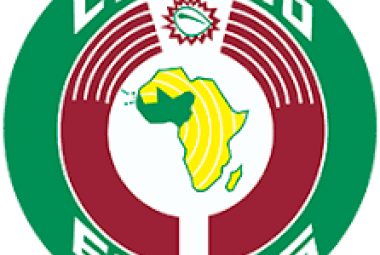|
The Right Hon. H.E Mr. Youssef Chahed, Chief of Government, Republic of Tunisia |
H.E. Dr. Li Bin, Chair of PPD Board and Vice Chairwomen of Chinese People’s Political Consultative Conference, Government of China H.E. Ms. Lindiwe Zulu, MP, Secretary of PPD Board and Minister for Social Development, Government of South Africa DrRamizAlakbarov, Director, Policy and Strategy Division, UNFPA
Honourable PPD Board Members
Members of Parliament
Excellences, Members of the Diplomatic and Consuler Corps,
Executive Director, PPD, Mr. Adnene Ben Haj Aissa,
Distinguished Delegates
Excellences, Ladies and Gentlemen
All other protocols duly and respectfully observed
Good morining
First and foremost I bring you greetings from the President of the Republic of the Gambia and the entire Gambian population and I wish to extend on behalf of the President of the Republic my heartfelt appreciation and thanks to the President and the people of Tunisia for the warm welcome and hospitality extended to me and my delegation since our arrival in Tunis.
I would like to commend the Executive Director of PPD for his leadership and personal interest in facilitating the promotion of south-south cooperation in population and development and through you I would like to thank PPD for this opportunity to give a remark at the opening of the Inter-Ministerial Conference on the theme ‘’Consolidating the Gains and Reaffirming the Commitments for the Achievement of the ICPD PoA and the SDGs’’ On behalf of my government and the people of the Gambia, I would like to thank PPD for bringing together countries of diversities with common interests to share experiences and best practices in the implementation of the ICPD programme of action. I am indeed very grateful to the government of Tunisia for hosting this year’s event.
In observance of the agreements made in ICPD held in Cairo in September 1994 exactly 25 years ago, the Government of The Gambia adopted the recommendations of the programme of action; critical amongst them is its membership to Partners in Population and Development and other bodies that promote South-South collaboration for sustainable development. The Gambia since then has started implementing the ICPD programme of action and made major inroads.
For instance in the area of Gender Equity, Equality and empowerment of women. The Gambia government continues to advance the course of women in all facets of human endeavour, The government of the Gambia is against all forms of discrimination against women. In line with this, the Gambia has ratified the convention on the elimination of all forms of discrimination against women (CEDAW).. The government of the Gambia protects women and girls in a number of policies and legislations notably, the Women Empowerment and Gender Policies and the Sexual and Domestic Violence and child sex tourism acts and the ban on child marriages and FGM/C.
Special attention is accorded to girls’ education. The Gambia has made significant achievements in attaining gender parity at basic levels of education. Young people especially girls are being funded by government to pursue higher levels of education.
Action is also taken to enhance women’s participations in decision making through their appointment to senior position in government and the civil service. More women are also increasingly seeking elective posts in the National Assembly and local Authorities.
In addition, The Gambia in its various development policies and programmes upholds the right of adolescents and youth to access information and services related to comprehensive sexual and reproductive health. The Gambia has taken steps to integrate adolescence and youths RH issues in the Health and National Population Policies and the National Development Plan.
Ladies and Gentlemen,
To demonstrate its commitment to the ICPD promises, the Gambia government has recognized the right to access to quality maternal and child care. In this regard, various components of reproductive health recommended by the ICPD programme of action are being offered as a part of the primary health care programme. Integrated services are being offered in RCH/FP clinics, and service providers have been trained to offer such services. Through the Ministry of Health and partners like the Gambia Family Planning Association (GFPA), Government is ensuring the provision of family planning service, realistic information and a wide range of contraceptives methods to cater for specific needs and reproductive goals of individuals and couples. The active participation of men and enhancement of this responsibility in all aspects of RH is being vigorously promoted. Responsible attitudes and behaviors among the teenage population are also promoted to ensure their sexual and reproductive health.
In reaffirming government’s commitment to reducing maternal and child deaths in the Gambia, the government of the Gambia in 2007 made the provision of maternal care in public health outlets free for all Gambians.
As a result of similar government and partner interventions in the past, the rate of maternal mortality although still high has reduced from 1050 in 1993 to 730 in 2001 and 433 per 100,000 live births in 2013.
Although, our current population trends and dynamics in relation to sustainable socio-economic and environmental development have been improving over the years, there are challenges that lie ahead. For example, the population growth rate has declined recently from 4.2% in 1993 to 2.8% in 2013 and 2.7% in 2013. Despite the decline in the growth of Gambia’s population, it is still described as young, with roughly 42 per cent under the age of 15 years. This youthful age structure means a high potential for rapid increase in population in the future as well as a high dependency burden on our economy. However, this kind of population momentum continues to pose threat to our development agenda and the fabric of our most cherished social cohesion
Sexual and reproductive health among teenagers is a major concern in The Gambia where many teenagers are sexually active at an early age. Adolescent fertility has been a growing problem with far-reaching social and economic consequences.
Distinguished Delegates
Despite the impressive strides made in promoting ICPD as well as the Sustainable Development Goals through the South–South initiative, there is still the urgency for us to redouble our efforts if we are to achieve our desired goals.
Therefore more efforts needs to be made to prevent maternal deaths and ensure access to voluntary family planning for us to benefit from a demographic dividend that would establish a balance between the population and the distribution of resources. This therefore calls for commitment from a broad range of partners: men as well as women, international organizations, government, civil society and the media
Let us join hands and work together to ensure that our children and grandchildren face a future filled with hope and opportunity, a future where they enjoy health and education, and can actively contribute to their societies.
Let us work together within the framework of south-south cooperation to ensure that girls and women are empowered and can enjoy equality with the men and boys in their families and equity and opportunity.
We must safeguard the rights of women, youth especially the girl-child and invest in their welfare as that is essential to their development and that of their families, communities and countries. Providing quality education, decent employment, effective livelihood skills and access to sexual and reproductive health, including comprehensive sexuality education, will ensure that their potential is fulfilled.
The solutions and experiences we would advance during the course of the conference would demonstrate that political will is critical to ensuring that commitments translate into action in realising our common goals of attaining the ICPD goals.
Partnerships are pivotal in pushing the agenda of ending all forms of discrimination especially child marriage and FGM/C. Let me emphasize that we cannot eliminate discriminatory cultural norms and attitudes that deny girls’ rights without our partnerships in ensuring that the voices of young women, traditional leaders, faith-based organizations and the private sector are heard. Together we are stronger.
My government will continue to create an enabling environment for the economic and social development of women, girls and young people. With the support of our development partners, we will provide the avenue for building life skills, and encourage delay in marriage and pregnancy, and eliminate all forms of harmful traditional practices.
I wish to use this opportunity to thank the government of Tunisia, Partners in Population and Development, the United Nations Population Fund (UNFPA) for their support to the Inter-ministerial Conference.
The Gambia on its part will continue to remain committed to the principles and ideals of the noble partnership that brings us together as developing nations with our divergent values and believes with a common goal to address population and development issues in our sphere of the world. The Gambia would therefore continue to promote SSC and would honor its obligation to PPD.
I thank you for your kind attention







